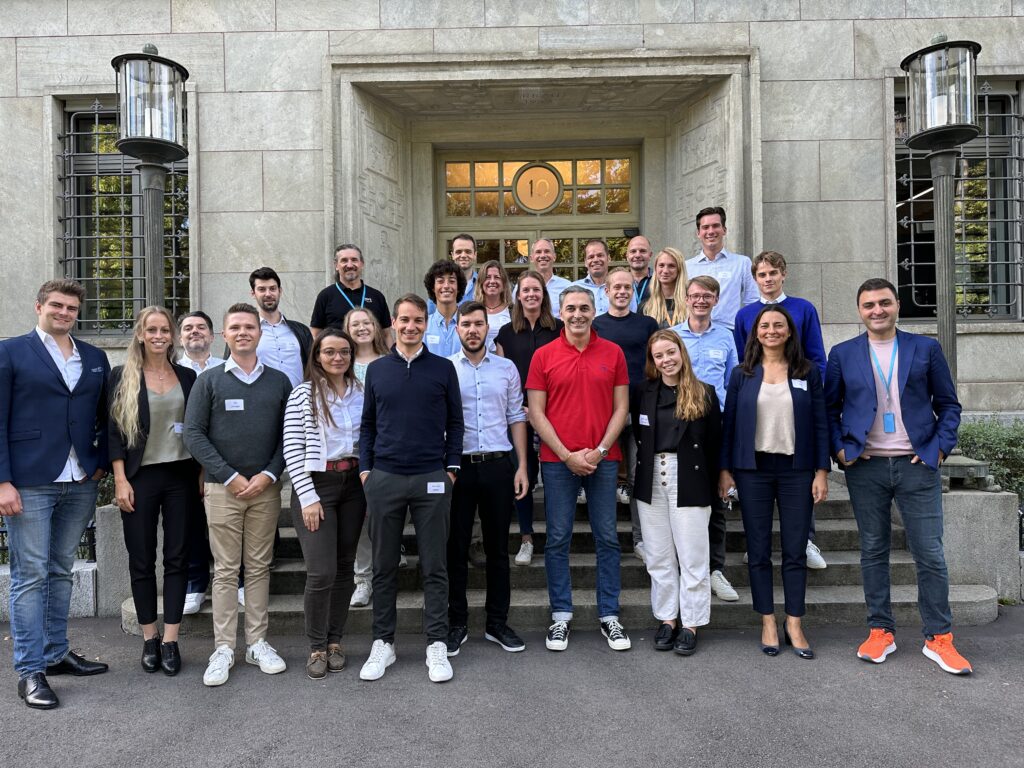
As general manager of Amazon Web Services for Switzerland and Austria (AWS Alps), Pasha Pourfallah knows first-hand the impact of cutting-edge technologies on leadership. Leading in the digital age comes with a unique set of challenges, which range from driving new growth to fostering an innovative culture, and even tech anxiety.
He recalled the time last year when he had to take a leave of absence from the cloud computing powerhouse for several weeks due to a family emergency. “Before I returned to my workplace, I worried about how I could restore my relevance to the organization, for my team and for the customers,” he said.
“I asked myself: ‘Will I be able to find my place in the organization again?’”
The incident also prompted him to do some soul-searching on the leadership crisis in the digital age. “These are issues catalyzed by the fast pace at which the world is moving and there is little management literature out there that discusses how leaders should tackle such a situation,” he said. “This is a challenge that I face on a regular basis.”
A career rooted in technological change
Pourfallah describes technology as a “red thread” running through his career. “Given my background and education, technology is probably the area that I can bring the most positive impact to companies and people. My conviction and ambition has always been to deliver this impact through technology,” he said.
He landed his first job as an engineering project manager at a subsidiary of Somfy, a French home equipment maker, but made an early pivot into IT and management consulting, guiding companies on their digital transformation journeys.
“When I was at Accenture, I ran business process outsourcing and operations, even large-scale HR operations with significant technology footprint such as SAP. During my time in Swiss Re, I also worked on technology projects quite a bit where I was part of an internal consulting function,” he said.
In 2014, he decided to take a career break and signed up for IMD’s MBA program. “Unlike a classic two-year program that focuses on finance, marketing, and accounting, subjects which I have already studied for my business administration degree [at Simon Fraser University in Canada], IMD provided a specific type of MBA program that I wanted to explore. The main areas that I wanted to focus on were developing my leadership skills and becoming more self-aware.”
Leadership lessons tailored to the digital age
Pourfallah recalled toughing out the high-pressure situations he faced during the IMD MBA program. In hindsight, he said, they signaled to him the importance of introspection and reflection and were a game-changer from a leadership standpoint.
“Put a bunch of ambitious people together in a room to work on deliverables, whether in coursework, the consulting project or the entrepreneurial startup project, and you’ll see how it pushes everyone to the limit and challenges them to deal with uncertainty,” he explained. “In doing so, it showed me why it’s so important to constantly reevaluate things and challenge our thoughts, which includes looking out for our own personal biases.”
Another key takeaway from the MBA experience was a newfound ability to cultivate an understanding of what he calls “the critical framework of decision-making,” which helped him to refine his personal leadership style.
“In the business world, organizational thinking prevails, and most people seem to conform and settle when it comes to decision-making. But IMD challenged me to break this habit and to be more aware of the need to develop resilience by considering a flexible framework,” he said. “It’s about dealing with the possible situations that can arise when you’re managing bigger organizations. That’s when leaders have to learn to deal with diverse subjects which are not the usual ‘hard’ topics such as sales, business margins, or new contracts. I’m talking about people’s issues which deal with external customers, internal employees, or even your superiors.”

Another valuable takeaway was mastering the art of leadership communication, including fostering a culture of collaboration and teamwork as well as conflict management.
“Imagine our class of 90 people from over 40 countries being organized into groups within a span of a couple of days to brainstorm and work together. Mind you, we were a bunch of people with strong opinions and beliefs, so it was crucial for us to find a middle ground to move things forward and advance the agenda of the team while ensuring that everyone’s voice is being heard,” he said.
“Ultimately, it boils down to leading with authenticity, understanding other people’s agenda, their way of thinking and establishing yourself in diverse environments, where you have to be not only an empathetic leader, but one who has to make hard decisions.”
Being a human-centric leader
Striking that delicate balance between strong leadership and empathy is no easy feat, and even more so in today’s fast-paced digitally disruptive environment, said Pourfallah. “The leadership crisis is especially evident in companies that are adopting new technologies and businesses that are undergoing digital transformation,” he said.
According to a recent report by Deloitte, leadership gaps are a major hurdle to successful digital transformation. The study also showed that leaders not only need to engage and inspire their people but also empower them for digital transformation to succeed.
Pourfallah concurs. He added that while digital transformation is often discussed at board level, the teams that are tasked with implementation are often unable to effectively drive the digital transformation process due to a lack of empowerment by top management.
“To effectively drive organizational transformation, tough decisions have to be made. It calls for a very different type of thinking and decision-making authority. For example, a mid-level operations manager may not be able to make the right decisions because they don’t have the entirety of view,” he explained.
“That’s why I believe that digital transformation has to be a top-down exercise and needs to be accompanied by empowerment.”
Nevertheless, Pourfallah cautioned, executives must still lead change with a human touch. “Organizations spend a lot of time evaluating emerging technologies, but they don’t spend enough time exploring what digital transformation means from a ‘human’ change management angle in the organization,” he said. “Ultimately, you have to go back to the people’s angle and make sure that your organization takes that into account.”


